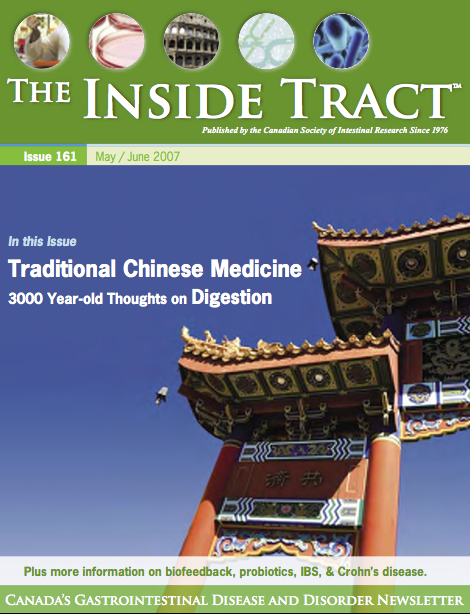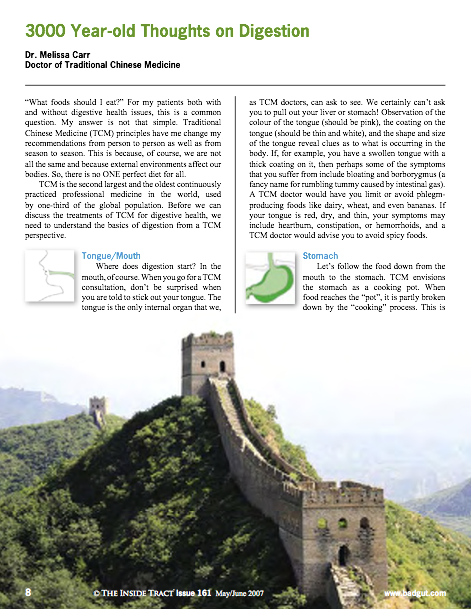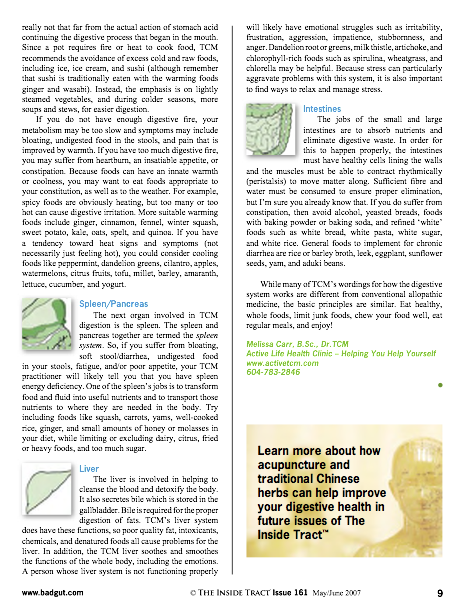My article as printed in Inside Tract about TCM and digestion:
“What foods should I eat?” For my patients both with and without digestive health issues, this is a common question. My answer is not that simple. Traditional Chinese Medicine (TCM) principles have me change my recommendations from person to person as well as from season to season. This is because, of course, we are not all the same and because external environments affect our bodies. So, there is no ONE perfect diet for all.
TCM is the second largest and the oldest continuously practiced professional medicine in the world, used by one-third of the global population. Before we can discuss the treatments of TCM for digestive health, we need to understand the basics of digestion from a TCM perspective.
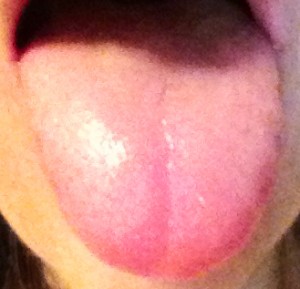 Tongue/Mouth
Tongue/Mouth
Where does digestion start? In the mouth, of course. When you go for a TCM consultation, don’t be surprised when you are told to stick out your tongue. The tongue is the only internal organ that we, as TCM doctors, can ask to see. We certainly can’t ask you to pull out your liver or stomach!
Observation of the colour of the tongue (should be pink), the coating on the tongue (should be thin and white), and the shape and size of the tongue reveal clues as to what is occurring in the body. If, for example, you have a swollen tongue with a thick coating on it, then perhaps some of the symptoms that you suffer from include bloating and borborygmus (a fancy name for rumbling tummy caused by intestinal gas). A TCM doctor would have you limit or avoid phlegm-producing foods like dairy, wheat, and even bananas. If your tongue is red, dry, and thin, your symptoms may include heartburn, constipation, or hemorrhoids, and a TCM doctor would advise you to avoid spicy foods.
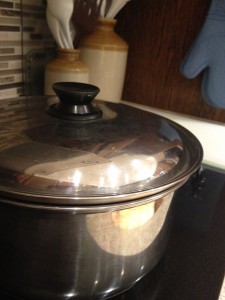 Stomach
Stomach
Let’s follow the food down from the mouth to the stomach. TCM envisions the stomach as a cooking pot. When food reaches the “pot”, it is partly broken down by the “cooking” process. This is really not that far from the actual action of stomach acid continuing the digestive process that began in the mouth. Since a pot requires fire or heat to cook food, TCM recommends the avoidance of excess cold and raw foods, including ice, ice cream, and sushi (although remember that sushi is traditionally eaten with the warming foods ginger and wasabi). Instead, the emphasis is on lightly steamed vegetables, and during colder seasons, more soups and stews, for easier digestion.
If you do not have enough digestive fire, your metabolism may be too slow and symptoms may include bloating, undigested food in the stools, and pain that is improved by warmth. If you have too much digestive fire, you may suffer from heartburn, an insatiable appetite, or constipation. Because foods can have an innate warmth or coolness, you may want to eat foods appropriate to your constitution, as well as to the weather. For example, spicy foods are obviously heating, but too many or too hot can cause digestive irritation. More suitable warming foods include ginger, cinnamon, fennel, winter squash, sweet potato, kale, oats, spelt, and quinoa. If you have a tendency toward heat signs and symptoms (not necessarily just feeling hot), you could consider cooling foods like peppermint, dandelion greens, cilantro, apples, watermelons, citrus fruits, tofu, millet, barley, amaranth, lettuce, cucumber, and yogurt.
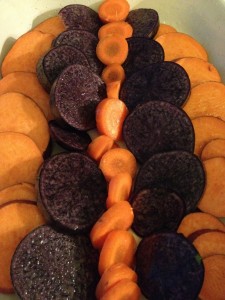 Spleen/Pancreas
Spleen/Pancreas
The next organ involved in TCM digestion is the spleen. The spleen and pancreas together are termed the spleen system. So, if you suffer from bloating, soft stool/diarrhea, undigested food in your stools, fatigue, and/or poor appetite, your TCM practitioner will likely tell you that you have spleen energy deficiency. One of the spleen’s jobs is to transform food and fluid into useful nutrients and to transport those nutrients to where they are needed in the body. Try including foods like squash, carrots, yams, well-cooked rice, ginger, and small amounts of honey or molasses in your diet, while limiting or excluding dairy, citrus, fried or heavy foods, and too much sugar.
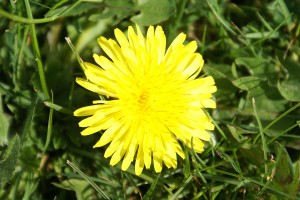 Liver
Liver
The liver is involved in helping to cleanse the blood and detoxify the body. It also secretes bile which is stored in the gallbladder. Bile is required for the proper digestion of fats. TCM’s liver system does have these functions, so poor quality fat, intoxicants, chemicals, and denatured foods all cause problems for the liver. In addition, the TCM liver soothes and smoothes the functions of the whole body, including the emotions. A person whose liver system is not functioning properly will likely have emotional struggles such as irritability, frustration, aggression, impatience, stubbornness, and anger. Dandelion root or greens, milk thistle, artichoke, and chlorophyll-rich foods such as spirulina, wheatgrass, and chlorella may be helpful. Because stress can particularly aggravate problems with this system, it is also important to find ways to relax and manage stress.
Intestines
The jobs of the small and large intestines are to absorb nutrients and eliminate digestive waste. In order for this to happen properly, the intestines must have healthy cells lining the walls and the muscles must be able to contract rhythmically (peristalsis) to move matter along. Sufficient fibre and water must be consumed to ensure proper elimination, but I’m sure you already know that. If you do suffer from constipation, then avoid alcohol, yeasted breads, foods with baking powder or baking soda, and refined ‘white’ foods such as white bread, white pasta, white sugar, and white rice. General foods to implement for chronic diarrhea are rice or barley broth, leek, eggplant, sunflower seeds, yam, and aduki beans.
While many of TCM’s wordings for how the digestive system works are different from conventional allopathic medicine, the basic principles are similar. Eat healthy, whole foods, limit junk foods, chew your food well, eat regular meals, and enjoy!

